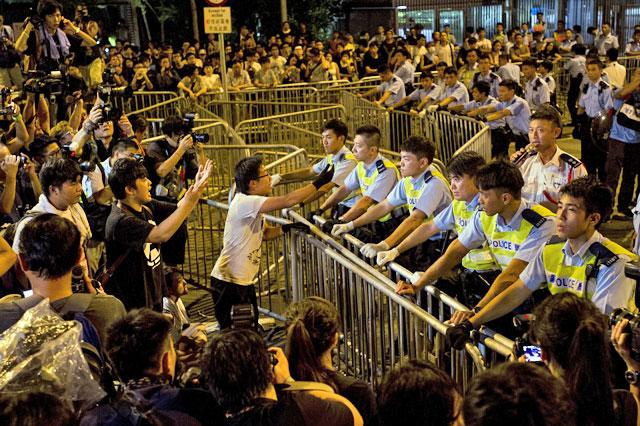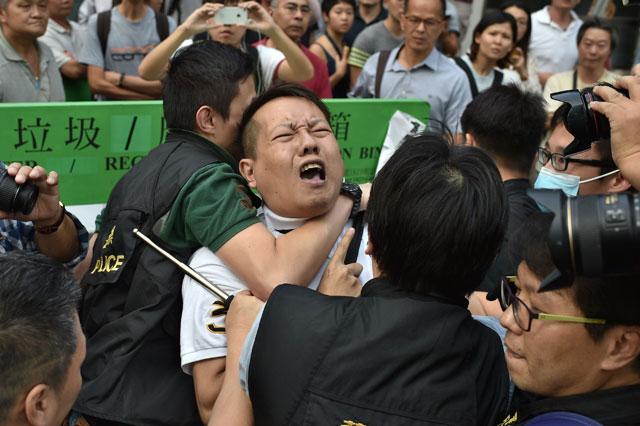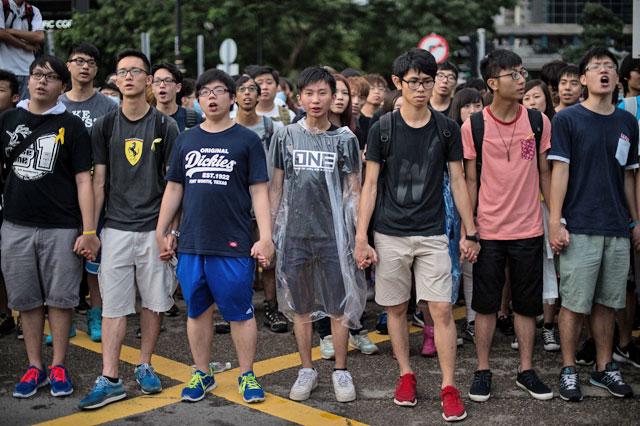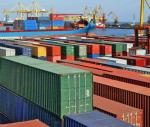You are here
Tensions soar in Hong Kong as police bring in rubber bullets
By AFP - Oct 02,2014 - Last updated at Oct 02,2014

HONG KONG — Tensions in Hong Kong soared Thursday after police were seen unloading boxes of tear gas and rubber bullets close to the city's besieged government headquarters as the authorities urged pro-democracy demonstrators to disperse "as soon as possible".
Protesters have shut down central areas of the southern Chinese city with a mass sit-in, including outside the city's legislative assembly, and have given Chief Executive Leung Chun-ying until midnight to step down, or face escalated action.
China backed the city's embattled leader saying it was behind Leung "firmly and unshakably" and pledged support for the police as protesters prepared for a fifth night on the barricades.
Days of peaceful demonstrations have seen tens of thousands of people take over the city's usually traffic-heavy streets as they demand Beijing grant fully free elections in the semi-autonomous city.
Last month China said Hong Kongers would be able to vote for their next leader in 2017 but only those vetted by a loyalist committee would be allowed to stand — something demonstrators have dismissed as a "fake democracy".
The city authorities Thursday said they wanted the streets cleared around the government headquarters with more than 3,000 civil servants expected to return to the headquarters after a two-day public holiday.
In a statement, officials called on protesters "not to block the access there and to disperse peacefully as soon as possible". Classes in the protest affected areas will also be suspended Friday, they added.
The late afternoon resupply by police officers caused widespread alarm among protesters as their leaders issuing fresh calls for people to swell their ranks.
Pictures shared widely on social media and television showed one barrel with the words "Round, 38mm rubber baton multi" written on it. Another had "1.5 in, CS" emblazoned on it, a possible reference to CS gas.
"I am worried that the police will use force to disperse the movement tonight," Andrew Shum, a member of Occupy Central, one of the main protest groups, told AFP. "Everyone is discussing what they are going to do next."
Escalation threat
China's Communist Party has shown no sign of bowing to protesters' twin demands that Leung step down by Thursday and that Beijing allow Hong Kongers to nominate their next leader.
An editorial in the Communist Party mouthpiece the People's Daily Thursday warned against chaos in the city adding Beijing supported "the police of the special territory in handling these illegal protests according to the law".
Beijing's latest comments came after China's foreign minister issued a stern warning to the United States not to meddle in its "internal affairs".
The demonstrators consider Leung a Beijing stooge and protest leaders want Thursday's ultimatum to be met.
"We will consider having different operating actions in future days, including occupying other places like important government offices," said Agnes Chow of student movement Scholarism.
Some analysts say it is unlikely that Leung will step down, in what would be a massive loss of face for the establishment.
"If Beijing forces him to resign, they will be seen to be buckling under pressure from the protesters. They might give out signals that he has been sidelined, but the likelihood of his immediate dismissal... is not very high," said Willy Lam, a China scholar at the Chinese University of Hong Kong.
However Lam added that the longer the protests affect Hong Kong, the more pressure Chinese President Xi Jinping will be under to act.
In a movement being dubbed the "umbrella revolution" — a nod to the umbrellas they have used to protect themselves against pepper spray, the sun and torrential downpours alike — the protesters have brought key parts of the city to a standstill, heavily disrupting the transport network and shutting down businesses.
Since police tear-gassed protesters Sunday, calls for Leung to step down have intensified.
The protests pose a huge political challenge for Beijing at a time when the Communist Party is cracking down hard on dissent on the mainland.
Authorities have scrubbed mentions of the protests from Chinese social media, while rights groups say more than a dozen activists have been detained and as many as 60 others questioned for expressing support for the Hong Kong crowds.
In a sign of Beijing's growing unease, a local tourism leader said Chinese travel agents were reporting that group visits to the city had been suspended.
October 1-7 is known as "Golden Week" in mainland China, a key shopping holiday that usually sees many travel to Hong Kong.
Related Articles
Chaos erupted in central Hong Kong Monday as dozens of masked men rushed barricades at the city's main pro-democracy site, sparking renewed accusations that authorities are using hired thugs to disperse demonstrators.
Pro-democracy protests in Hong Kong have handed China's communist leadership a thorny political dilemma.
A student leader vowed Wednesday to step up Hong Kong's huge pro-democracy protests — including a possible occupation of government offices — unless the city's leader steps down within a day, as support for the movement grew around the world.

















